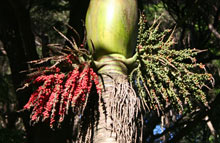Storing and growing seeds
Introduction
Learn how to treat, store, sow and pot your ecosourced seeds.Treat and store seeds
Before planting or storing, seeds should be removed from any capsule, pod or fruit. Some may require drying to open. For example, leave manuka capsules and flax pods in a paper bag in a warm place and they will open and release the seed.

Nikau with fruit
Kowhai seeds should be removed from the pod and will keep for some time stored dry. To break the dormancy, prick with a pin or cut the end with a knife and soak overnight. The seed that swells or sinks to the bottom of the container can then be planted and should germinate within seven days.
Capsules with sticky-coated seed should be dried then crushed to remove the capsule shell. Then mix with sand and rub between two pieces of wood to remove the stickiness.
For fleshy fruits, soak in water for several days to soften the fruit. Then hand peel or rub the seed over a sieve to remove the flesh. The pulp can be decanted off leaving the seeds behind. Dry the seed if it is to be stored.
Plants such as Coprosma, cabbage tree, mahoe, Pseudopanax, wineberry, pate and tawa germinate rapidly without cleaning and should be sown immediately.
The viability period of most seeds can generally be increased by storage in a sealed plastic bag in a refrigerator. But in general, fresh is best! Sow seed as soon as possible after collection. The exception to this is where it may be difficult to protect seedlings from frost. In this case, storing the seed until late winter may be a better option.
See the collection and propagation guide for seed description and propagation techniquies for a selected range of seeds.
Sow seeds
Fill a clean container or seed raising tray with seed raising mix to within 3 cm of the top. Press down mix. Sow seeds. Keep damp, warm and shaded until germination.
Fine seeds - grasses to cabbage tree size:
- Sow on surface evenly but not too thickly.
- Cover with a thin layer of seed raising mix and/or fine pumice.
- Keep damp – do not allow the tray to dry out, keep warm (20°C) and shaded until germination.
Larger seeds - from trees, bigger than cabbage tree seed:
- Place seeds evenly spaced on the surface.
- Push seeds into the surface.
- Cover with a thin layer of potting mix and fine pumice. Keep damp, warm (20°C) and shaded until germination.
Handy tip
Manuka and kanuka seeds can be sprinkled directly onto the top of PB ¾ bags filled with seed raising mix. These plants do not need to be potted on and can be planted directly from the PB ¾ size bag as a group. Stronger plants will dominate.
Transplant small seedlings into trays, or small plastic tubes. The best stage for pricking out seedlings is at the two-leaf stage. Seedlings this small have only two feeder roots and therefore suffer less root tangles and root shock during re-potting.
Prick out seedlings
- Thoroughly soak the seedlings.
- Carefully insert trowel and loosen a small area.
- Remove one seedling carefully without damaging the root hairs.
- Fill a tube with potting mix (low fertility).
- Make a hole in the potting mix. A purpose made tool resembling a pencil (dibbler) can be useful for this.
- Place plant roots in hole and carefully cover.
- Water thoroughly to settle the mix around the roots.
- Place in cool, shady place for at least a week so plant can recover from transplant shock.
Pot on
The objective of 'potting on' is to build up a compact rootball that will hold together when the plant is removed from the pot. As the plant grows, roots will grow out the bottom of the bag and the plant should be progressively potted on into larger bags.
Don’t put small seedlings into too large a pot. Fertiliser in potting mix generally lasts for nine months to a year so anticipate the size the plant will grow to in that time and choose an appropriately sized bag. As a general guide, pot on PB ¾ into PB2 or PB3 size bags and pot on PB3 to PB6.5 or PB8 size bags.
